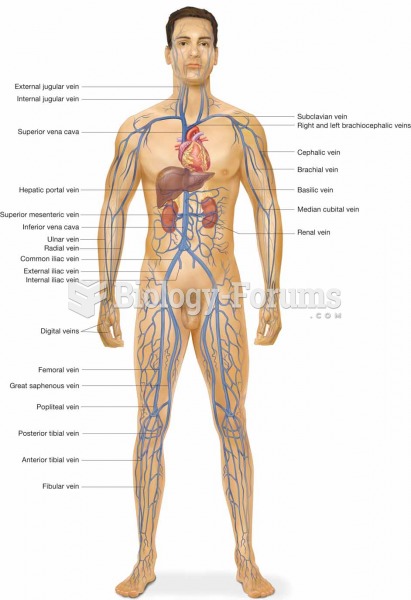Answer to Question 1
Correct Answer: 3
Rationale 1: I will probably feel pain during the procedure is incorrect because the goal of general anesthesia is to provide a rapid and complete loss of sensation.
Rationale 2: I won't feel a thing because I will be asleep is incorrect because some brain activity actually increases during sleep.
Rationale 3: The goal of general anesthesia is to provide a rapid and complete loss of sensation. Signs of general anesthesia include total analgesia (no feeling of pain) and loss of consciousness, memory, and body movement. Although these signs are similar to those of sleeping, general anesthesia and sleep are not exactly the same. General anesthetics stop all nervous activity in the brain, whereas sleeping stops activity in only very specific areas. In fact, some brain activity actually increases during sleep.
Rationale 4: I will retain all memory of my procedure is incorrect because the goal of general anesthesia is to provide a rapid and complete loss of sensation and loss of consciousness, memory, and body movement.
Global Rationale: The goal of general anesthesia is to provide a rapid and complete loss of sensation. Signs of general anesthesia include total analgesia (no feeling of pain) and loss of consciousness, memory, and body movement. Although these signs are similar to those of sleeping, general anesthesia and sleep are not exactly the same. General anesthetics stop all nervous activity in the brain, whereas sleeping stops activity in only very specific areas. In fact, some brain activity actually increases during sleep. I will probably feel pain during the procedure is incorrect because the goal of general anesthesia is to provide a rapid and complete loss of sensation. I won't feel a thing because I will be asleep is incorrect because some brain activity actually increases during sleep. I will retain all memory of my procedure is incorrect because the goal of general anesthesia is to provide a rapid and complete loss of sensation and loss of consciousness, memory, and body movement.
Answer to Question 2
Correct Answer: 4
Rationale 1: Increased intracranial pressure and respiratory depression is incorrect because nitrous oxide should be used cautiously in patients with myasthenia gravis, because it can cause respiratory depression and prolonged hypnotic effects.
Rationale 2: Nausea and vomiting during surgery is incorrect because nitrous oxide should be used cautiously in patients with myasthenia gravis, because it can cause respiratory depression and prolonged hypnotic effects.
Rationale 3: Increased cranial pressure and vomiting is incorrect because nitrous oxide should be used cautiously in patients with myasthenia gravis, because it can cause respiratory depression and prolonged hypnotic effects.
Rationale 4: Nitrous oxide should be used cautiously in patients with myasthenia gravis because it can cause respiratory depression and prolonged hypnotic effects. Patients with cardiovascular disease, especially those with increased intracranial pressure, should be monitored carefully because the hypnotic effects of the drug can be prolonged or more powerful.
Global Rationale: Nitrous oxide should be used cautiously in patients with myasthenia gravis because it can cause respiratory depression and prolonged hypnotic effects. Patients with cardiovascular disease, especially those with increased intracranial pressure, should be monitored carefully because the hypnotic effects of the drug can be prolonged or more powerful.







